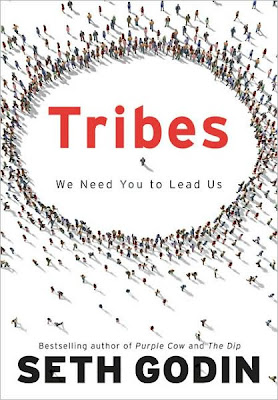I just completed marketing maven Seth Godin’s book on leadership titled “Tribes – We Need You to Lead Us”.
As a long-time fan of “Sethology”, I have always marvelled at his cutting edge ideas and thought provoking approaches to marketing, lapping up past works like “Purple Cow”, “The Big Moo”, “The Dip” and “Meatball Sundae”. I am also an avid reader of his wonderfully written blog, which is a must-visit site on my list of must-visit sites.
Unlike other more academic authors, Godin embraces a more anecdotal story-telling approach as opposed to prescribing templates for others to follow. Tribes, a light 150-page volume, is written in Godin’s simple and engaging narrative style.
Tribes offers useful nuggets of advice and inspiring stories aimed to move leaders and potential leaders in any commercial or non-profit field. However, it stops short at offering specific formulae, encouraging readers to search for their own holy grail of leadership success.
According to Godin, leaders should be like heretics who are “engaged, passionate, and more powerful and happier than everyone else.” They should aspire to start movements, whose followers can number anywhere from “10 to thousands”.
As initiators of tribes, leaders should never be satisfied with the status quo. They can create revolutions as huge as the democracy movement in Tiananmen Square or one as focused as a worldwide collection of tattoo lovers. Tips on doing so include publishing a manifesto, making it easy for your followers to connect with you (using largely social media tools), making it easy for your followers to connect with each other, and tracking your progress.
In Seth’s book, the best time to start a movement is now. Risks are also a given in this game. Unlike rule-following, policy prescribing managers, leaders are seen as debonair entrepreneurs, cowboys who are willing to take off from the word “Go” with nary a concern about what others think about them.
Peppered by stories of “deviants” like Jerry Sternin who started a movement to save starving kids in Vietnam, and Nathan Winograd, who prevented the rampant killing of stray dogs and cats, Tribes isn’t Leadership 101 in a nutshell. Readers hoping to learn the nuts and bolts of leadership will be sorely disappointed as the book steers clear of the systems, structures and skills needed to helm organisations.
Serving more to provoke than to instruct, the book is heavy on preaching but short on equipping. While it purports that people of any rank or organisation can be a leader, the finer points of leadership skills such as motivating and encouraging one’s followers are missing.
Most of the sections also read like disparate blog posts. While they are fairly self-contained individually, they somehow fail to build upon each other to prove a point. I suppose this is intentional on the author’s part as it makes it easier for the ideas contained within the book to be further built upon by social media communities and fan groups.
Overall, Tribes is a highly recommended book for anybody who needed that kick in the pants to get them going. If you nurse a burning desire to change the world (or maybe your neighbourhood or workplace), this book is for you. Readers who want a prescriptive “How To Do It” text however are probably better off looking elsewhere.


I haven’t read Tribes, but I read Seth’s All Marketers are liars and the purple cow.
For Seth, the traditional mass marketing approach is reach its end and it is there important to find new ways to market.
In All marketers are liars, Seth was telling the world that marketing should be about story telling, not fact pushing.
Somehow, humans tend to want to believe the story rather than the facts.